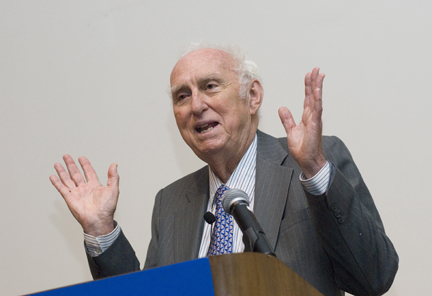Dr. Martin L. Perl, Nobel Laureate in Physics and Polytechnic alumnus, shares his insights on developing creativity and innovation in science and engineering at Presidential Lecture. Where do great scientific and engineering ideas come from? Albert Einstein once explained that his “ah-ha” moments occurred in three places: bed, bath and bus.
Dr. Martin L. Perl, Polytechnic Institute of NYU’s own Nobel Laureate in physics, would agree. Inspiration often does strike outside of the laboratory.
At his lecture on June 18, “Developing Creativity and Innovation in Science and Engineering,” Dr. Perl who graduated Polytechnic with a B.S. in chemical engineering in 1948 and received the Nobel Prize in 1995 for his discovery of the tau lepton, a negatively charged elementary particle, told the audience to “limit your working hours. Creativity and innovation require relaxation time and non-technical activities.”
That’s not to say that obsession is a bad thing. In fact, Dr. Perl thinks obsession is a requirement. He said that while family and friends may feel frustrated with their loved one’s fixation, engineers and scientists should live, breathe and sleep the particular problem they’re trying to solve.
He cautioned that “sometimes you have to give up the obsession” if a solution is ultimately out of reach. “If it’s a good idea, a future generation will pick it up.”
“The truth,” Dr. Perl said, “is that you will mostly get bad ideas. For every good idea, expect to have five or 10 bad, wrong or useless ideas.”
He suggested good engineers and scientists could limit the frequency of bad ideas — or at least not waste time pursuing them — by sharing nascent ideas with other people for feedback and collaborating with colleagues who are “smarter than you” because, as Dr. Perl said, “success multiplies.”
Dr. Perl doesn’t think that creativity can be taught, but he does agree that rigid curriculum and academic departments that work in isolation can discourage it. He suggested designing courses where the professor doesn’t always know the answer to foster creative problem-solving. He also said that “the smallness of Polytechnic is a real benefit to creativity.”
Dr. Perl is a professor emeritus at the Stanford University Linear Accelerator Center. He currently serves on the Board of Advisors of the Scientists and Engineers of America, an organization committed to promoting sound science in American government. |





